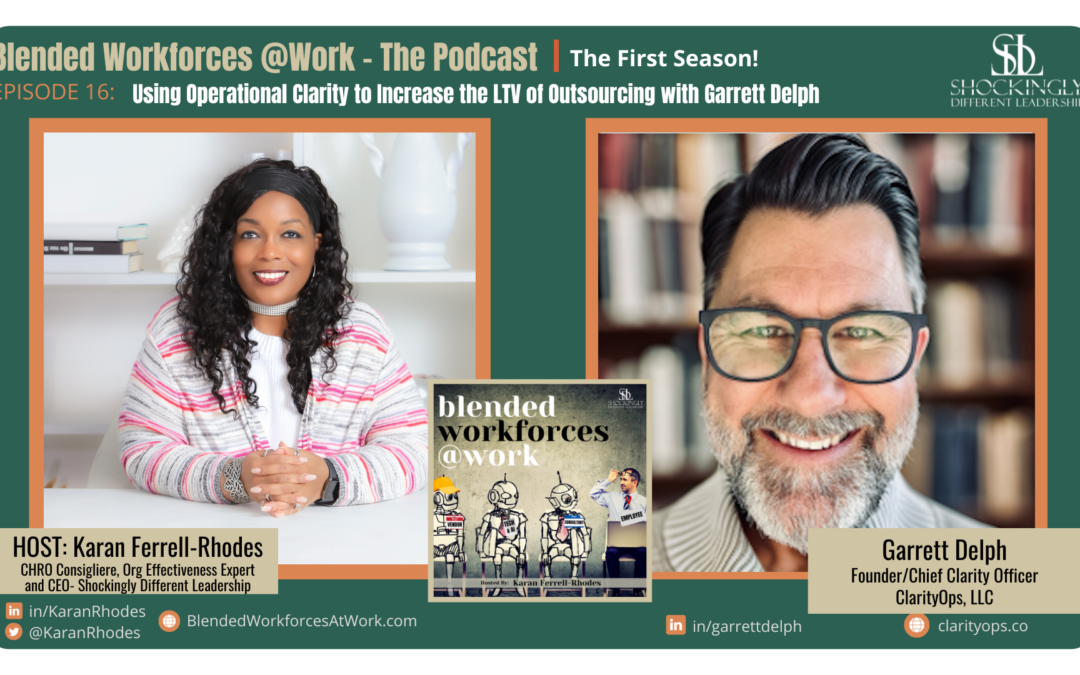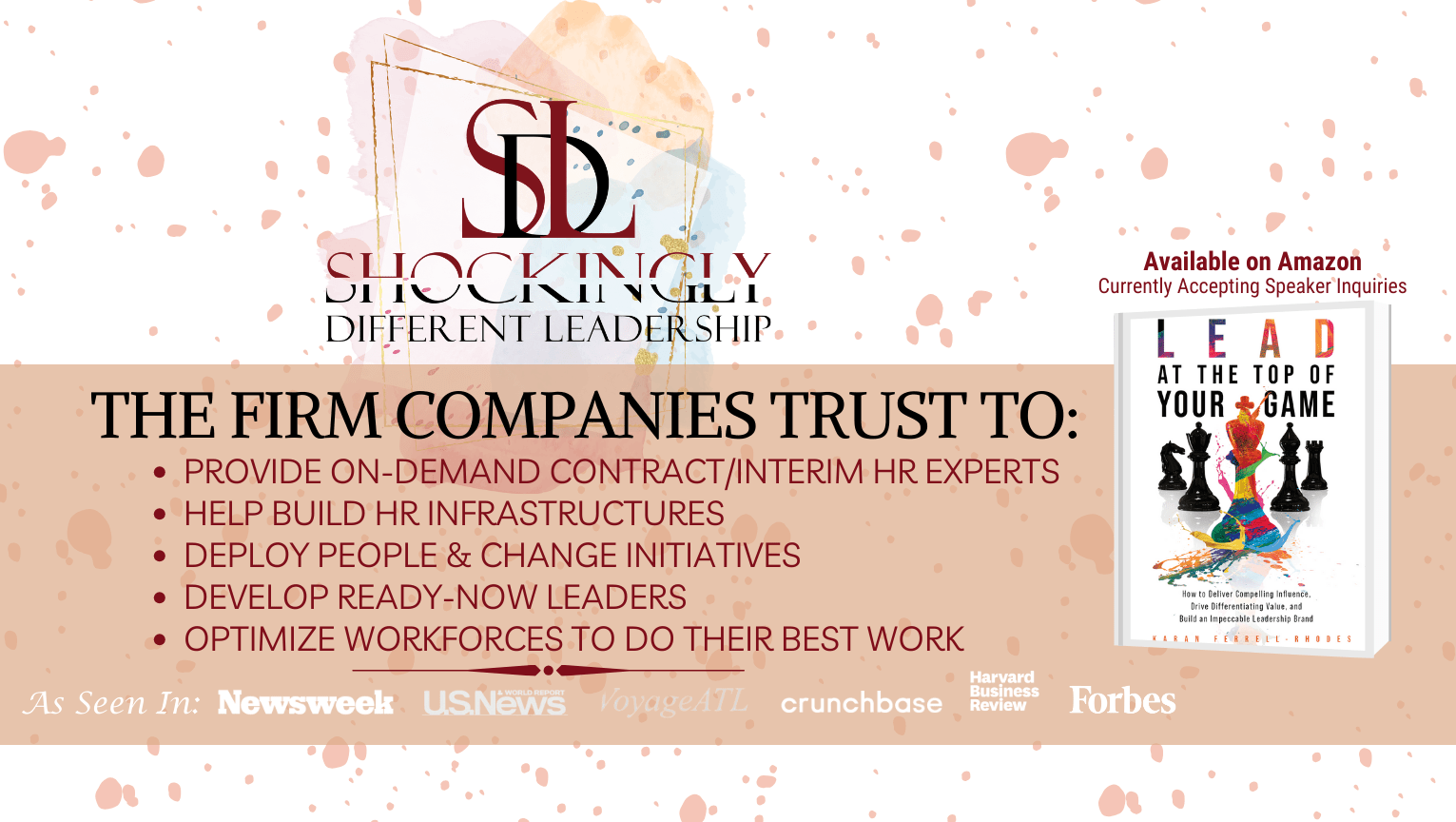IN THIS EPISODE, KARAN FERRELL-RHODES INTERVIEWS GARRETT DELPH.
During today’s conversation, Garrett explores the power and challenges of a blended workforce, outlines crucial standards for achieving success with this approach, and delves into a range of other insightful topics!
Garrett Delph is the Founder & CEO of ClarityOps, a company dedicated to guiding businesses through the intricacies of expansion. With a first-principles approach, ClarityOps focuses on identifying the root causes of business challenges, ensuring comprehensive and effective strategies. Garrett and his team develop tailored solutions that eliminate chaos, restore order, and empower businesses with renewed momentum for sustainable growth.
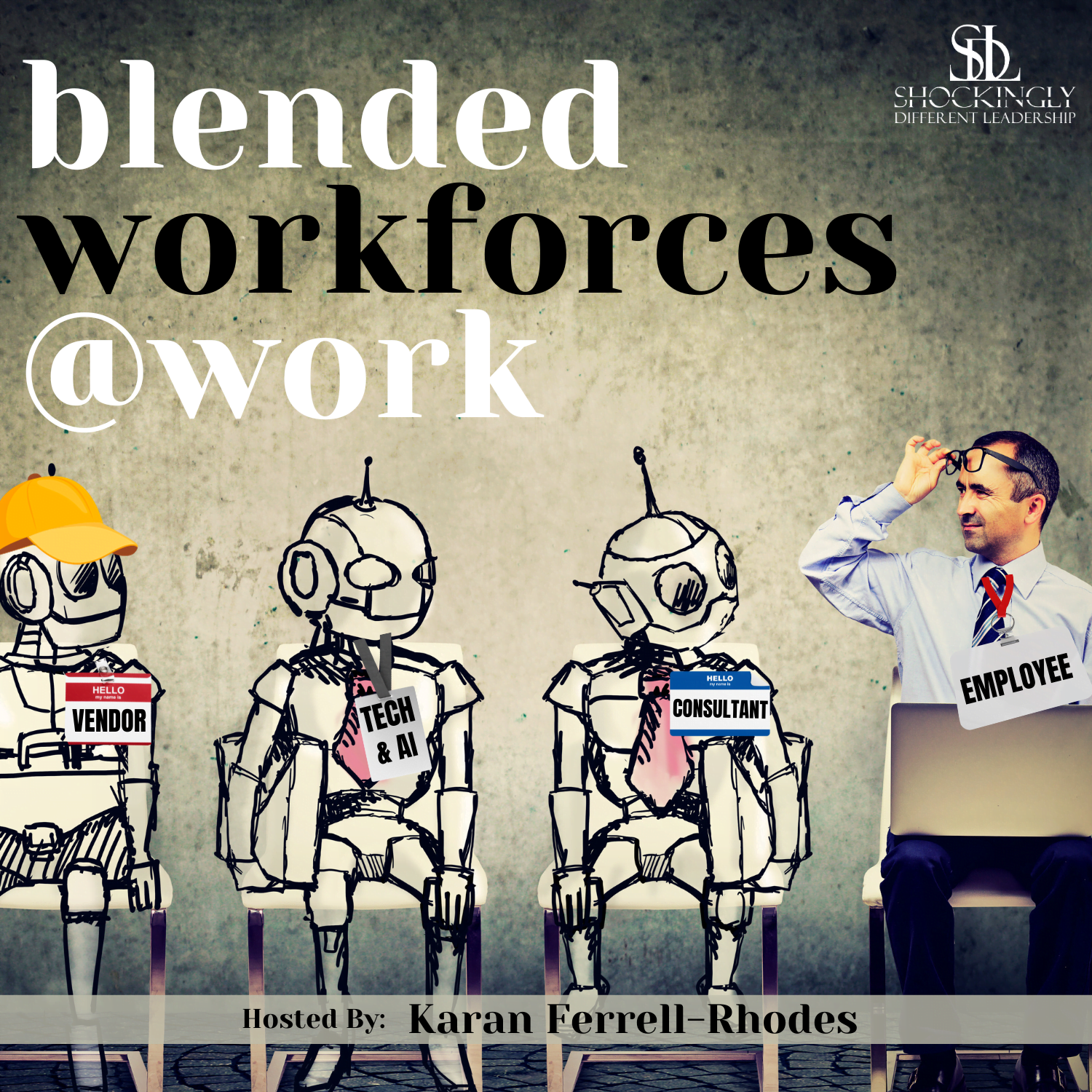
Posted by
SDL Media Team
Rather view our video podcast?

WHAT TO LISTEN FOR:
- What is the power of a blended workforce?
- What are the challenges associated with a blended workforce?
- How does strong business infrastructure benefit organizations?
- What are the three key standards for blended workforce success?
- Why is leading with a drive for results significant in leadership?
- What approach does Clarity Ops use to solve business challenges?
“Usually execution is really heavy lifting, but you have to love that [type of work] to be effective.”
FEATURED TIMESTAMPS:
[02:56] A Glimpse into Garrett’s Life Beyond Work
[04:59] The Journey to Founding ClarityOps
[07:52] Target Market and Engagement Model of ClarityOps
[09:51] The ClarityOps Approach to Diagnose and Solve Business Challenges
[10:52] How ClaritOps Ensures Lasting Business Transformation
[13:05] Strategic Problem Solving and Passionate Implementation
[15:41] Power of a Blended Workforce
[16:51] Challenges of a Blended Workforce
[18:21] The Crucial Importance of Business Infrastructure
[20:22] Signature Segment: Garrett’s entry into the LATTOYG Playbook: Three Key Standards for Blended Workforce Success
[27:42] Signature Segment: Garrett’s LATTOYG Tactic of Choice: Leading with a Drive for Results
[30:25] ClarityOps: Reach Out and Discover More About Clarity Ops

ABOUT GARRETT DELPH:
Garrett Delph brings over 25 years of experience building multiple globally scalable businesses specializing in high-value, high-profit, and bespoke scalable technology systems managed by human oversight. In his career, which has spanned over a quarter century, Garrett has dedicated 12 years to developing and leading both on-premises and remote international teams.
His core strengths lie in architecting finely tuned organizational cultures, cultivating leadership among management ranks, and driving significant business growth on a large scale.
Garrett is passionate about delivering dependable and repeatable planned operational business results. The benefits of his strategic initiatives include reduced operational expenditures, maximized efficiencies, enhanced organizational transparency, unity, measurable performance improvements, scalability, elevated morale, reduced stress levels, minimized turnover, and substantial margin growth.
He believes fervently in fostering a people-first environment where mutual empowerment and support thrive through a shared commitment to operational and cultural integrity.
LINKS FOR GARRETT:
- Website: clarityops.co
- LinkedIn: linkedin.com/in/garrettdelph
PEOPLE & RESOURCES MENTIONED:
- Contact Form: clarityops.co/contact
- Email: mailto:getclarity@clarityops.co
ADDITIONAL RESOURCES FOR YOU:


Episode Sponsor
SDL is the go-to firm companies trust when needing to:
- supplement their in-house HR teams with contract or interim HR experts
- implement leadership development programs that demonstrate an immediate ROI and impact on the business

Episode 16 | Using Operational Clarity to Increase the LTV of Outsourcing with Garrett Delph
Garrett Delph 00:00
When you realize, oh my gosh, there is this swiss army knife of opportunities to achieve your goals, which actually could help you be faster, more lean, under budget, better quality, you know, higher value like and so when it comes to blended workforce, I think the education of that and helping people understand you have options becomes really powerful and really useful.
Karan Rhodes 00:28
Blended workforces are one of the hottest talent strategies today, where employers are using a mix of traditional employees with external resources like independent contractors, coaches, consultants, vendors, and technology solutions, all in order to enhance competitiveness, ensure cost flexibility, and expedite business goals. But how are the successful companies infusing blended workforces into their business strategy? And what are the critical success factors and pitfalls to avoid during implementation? And on the flip side, what does it really take for suppliers to improve their chances of finding and landing contract opportunities? The devil is in the details, my friends! I’m your host, Karan Ferrell Rhodes, and it’s time to get smarter about Blended Workforces at Work! Hello my superstars out there this is Karan and welcome to another episode of the Blended Workforces at Work podcast. We want to welcome to today’s show of a fantastic guest that I just know you’re going to love by the name of Garrett Delph. He’s the founder and chief clarity and clarity officer at ClarityOps, LLC. And ClarityOps LLC is a consultancy that guides businesses through the complexities of expansion. During people process performance in digital transformations. He has a focus on helping their clients gain true clarity of what the problem truly is, and then how to find solutions and implement them. And he and his team design the solutions that dispel chaos that you know that comes during transformations of all types, reestablish order, which all leaders beg to have and empower businesses with renewed momentum for growth. So in other words, he’s a miracle worker. So we’re pleased to welcome Garrett to the episode. How are you doing Garrett?
Garrett Delph 01:57
Hey, I’m great, Karan, I’m great. Thank you for having me.
Karan Rhodes 02:00
Welcome to the show. Welcome to the show.
Garrett Delph 02:03
Thanks so much.
Karan Rhodes 02:04
So I know that was a mouthful, and we’re gonna unpack what clarity ops does in particular and then also have a chat about you know, your thoughts and experiences on using blended workforces to help businesses scale. But before we get down in the deep and dirty, we’d love to learn just a tad about you personally. So for as much as you feel comfortable. Would you give us a sneak peek into your life outside of work?
Garrett Delph 02:56
Sure, sure. It’s pretty simple. So I’m married. We have four beautiful kids. They span kind of the full spectrum we our oldest is 25 Our youngest is 14. So we’re forever parents it feels like that keep they all keep us very busy. And they’re great. Outside of that I’m a fellow entrepreneur and so I eat, breath, drink, sleep, business when I have downtime outside of my family I’m typically reading I’m a big funny enough not a big sports fan, but I love sports documentaries because I think they apply to business and life so
Karan Rhodes 03:35
They do, yea.
Garrett Delph 03:36
Love documentaries love to read big audible fan and that those are in oh I love to eat I love to get to what I love to eat. Yea, we have, like your favorite restaurants we love to go to
Karan Rhodes 03:53
Very nice so it sounds like you have a very full and fulfilling life. We’re recent empty nesters so we’re getting readjusted to that but the youngest is literally eight minutes away so
Garrett Delph 04:07
That is fantastic.
Karan Rhodes 04:09
So…I don’t know how empty that is because they come here all the time but is totally fine. And we have a very close family it sounds like you do as well.
Garrett Delph 04:18
Yeah, it’s the best isn’t it?
Karan Rhodes 04:20
It is it totally is
Garrett Delph 04:22
I think that’s the perfect scenario by the way 10, 15 minutes away not enough where they can just camp at home.
Karan Rhodes 04:30
Right right.
Garrett Delph 04:31
You know. But far enough you can see him real quick,
Karan Rhodes 04:33
Really quick. Anything they need. Yeah, definitely. Well, thanks so much for sharing that let’s get down to this let’s if we can
Garrett Delph 04:42
Let’s do it
Karan Rhodes 04:43
and forgive the oxymoron there. But let’s start out Garrett by you for sharing maybe a snapshot of your career thus far and why you up to the point now that why you founded clarity ops.
Garrett Delph 04:59
Sure I’ll try to be succinct here. So I’ve been out of college, I did kind of what a lot of us do when got a corporate job started with Gallo wine of all places largest winery in the world. So I was a sales rep in Los Angeles, that led to a couple of other opportunities, which I pursued. But after about seven years in corporate America, and learning a ton, I just decided I had things I want to do myself. So that led me into ultimately founding three different businesses over my 25 year career so far as an entrepreneur, wow, I’ve had three exits. And during that time, you know, really what led to ClarityOps is, I was, I think, probably a classic entrepreneur that didn’t know much. I just knew what I wanted to do. I didn’t know how to do it. But I had drive and ambition. And I was going to charge and went in making a lot of mistakes, and learning a lot of hard lessons. But along the way, is I faced problems, either I didn’t know how to go find solutions for my problems, or they did not exist. And I’d say probably a good solid 50% of the problems I faced that were unique to my business domain, I needed to invent solutions on my own. And so over the course of these years, I ended up with, ultimately a library of tools that were built by myself and my teams, solve our own problems, which work. And so it was kind of like, you know, AWS, I don’t know if you know, the AWS story, AWS was birthed. Because Amazon was solving their own problems with their own solutions, because nobody had them. And then they realized, oh, my gosh, these could serve the world. And AWS is born. Right? Right. So that really, I’m not saying cClarityOps is like AWS, but the point…
Karan Rhodes 06:56
Oh it is. In some way. A sliver of the world.
Garrett Delph 07:01
It would be nice. It would be nice. But at the end of the day, what I’ve realized just being in the network, and my network and being in the business world, that leaders, founders, CEOs, the C suite, especially those that are focused on growth face a tremendous amount of challenges. And, and I think we have clarity ops myself have tools that actually could drive significant change with these tools. And that’s really why clarity Ops is now here and, and serving the community.
Karan Rhodes 07:32
Oh, that is amazing. So what is a typical engagement that you have? First of all, who’s your target market? If you could share that? And then what’s the typical if there is a singular target market? And what is the typical engagement or an example of a typical engagement that a potential client would come to you all for?
Garrett Delph 07:53
Yeah, so the market that we best intersect with, and I think, out of the gate, bring value begins with kind of a revenue threshold. So typically, three to 5 million in annual revenue is the starting place. And that’s just because if you’re doing that kind of revenue, you’ve already, you know, encountered some bumps and bruises along the way. And you’ve right, so you got to see you have some maturity there typically. The next is ultimately, the domains are those where people and process are interdependent. Where, and typically, this is service based businesses that need processing people to deliver their outputs to their target customers. So that whatever that is, manufacturing, probably not something we, you know, would pursue, but that’s an example market wouldn’t do all the others would fall into the bucket. And then the other criteria is, they’re struggling, they have pain, and they’re too close to their problems to bring solution, you know,
Karan Rhodes 08:57
It’s every business that I’m in my spare consulting business
Garrett Delph 09:01
because you’re biased, right.
Karan Rhodes 09:03
Right!
Garrett Delph 09:04
And you have a lot of internal narratives that make excuses for why things are not problematic. Or the other side is they have problems and honestly genuinely don’t know how to fix them. And they need another pair of mature eyes to get on top of the problem and fix it so they can get back to growing and producing the profit, the revenue that they they want, and the value and the value.
Karan Rhodes 09:28
Absolutely.
Garrett Delph 09:29
And then in terms of so I think that
Karan Rhodes 09:31
Yeah, that answers the question. Yeah.
Garrett Delph 09:34
And then the typical engagement is, first of all, get the lay of the land. We do a thing called a health audit, the term health is by choice. And that’s just a six step process we go through to take a look at what they’re trying to achieve why they’re in pain. Sometimes pain is symptomatic, but it’s not the root of the problem. And so that’s part of the health audit to identify the truth first and foremost, and separate the sort of chaff from the wheat separate, what perhaps they think is the problem, or problems versus what really are the problems. And then from there, we have different paths we can take, based on budget timeline, and needs wants,
Karan Rhodes 10:18
I would imagine what these type of transformations, this is not like an hour long consultation is a longer term type of engagement, first, for the discovery and diagnosing, and then once you co-create solutions with them, the actual implementation would take a bit as well. Is that true or no?
Garrett Delph 10:43
It is very true, I’d say a minimum engagement for the health audit will be, you know, 30 to 45 days.
Karan Rhodes 10:50
Yeah, that sounds right.
Garrett Delph 10:52
And I appreciate your point about, you know, implementation of a plan. So what the health audit will do is it will actually identify the truth, and then propose a plan for solving the pain and the problems. And then at that point, businesses have a choice. You know, sometimes they’re excellent operators just struggling with problems. But they can take that plan and execute mostly however, that is, the other part of the big problem is they’re so focused on sales, marketing and revenue, that executing continuous improvement or transformational programs.
Karan Rhodes 11:28
Yeah
Garrett Delph 11:29
Is very difficult. And so I think that’s one of the areas that ClarityOps is a differentiator, we don’t just get strategy, but tactical implementation, when we actually can help build and deploy inside of an orc, so they can, you know, reap the benefits of that. And then, in addition, we have a maintenance support program as well. So we can just ensure that what is built to transform into future success, and, you know, sustenance, also can be maintained by design, so that doesn’t fall apart.
Karan Rhodes 12:04
Yes, because that’s the biggest waste of money when you implement and don’t have a sustainability or maintenance plan, because without it, and that support, it’s gonna go by the wayside, and they’re gonna get frustrated for the investments that they made.
Garrett Delph 12:20
500%
Karan Rhodes 12:21
Yeah, I see that a lot in SDL. Because we focus on the people, infrastructures, and people transformations. And we see that all the time. I always say, I’m always thankful for the big boy firms like McKinsey, because they bring out a lot of the opportunity that’s within a company, but they charge so much, we get a lot of, because we focus on implementations as well. So we companies hear it all but then they’re like, they’re not the ones that help us do all that we need somebody that’s more hands on. It’s more right. Well, understandable. And so I can’t tell you how many engagements we’ve gotten. Thanks to McKinsey being too big.
Garrett Delph 13:05
Yeah, they’re They’re notorious for how to solve problems, how to fix them. I mean, that that is the strategy value. But some, you know, the, once you have the how, what to do to achieve the how is where the, the implementation, I think just almost becomes just as important, if not, perhaps, maybe more important. I don’t know.
Karan Rhodes 13:30
I totally agree.
Garrett Delph 13:30
It’s, you know, it’s great. And I think too, when it comes to, you know, being a, you know, implementer Yeah, you gotta love it. And
Karan Rhodes 13:39
Yes! You gotta love it.
Garrett Delph 13:40
Usually executions really heavy lifting. And you just gotta love that work to be effective. I tend to be a geek like that. And my team, we tend to be weird like that where we actually liked the hard work. I think primarily, my perspective on that is I’ve seen the benefits of the hard work like it works, you know,
Karan Rhodes 13:46
It does, if you have the right resources and support behind it. It can definitely work.
Garrett Delph 14:07
Yeah, I agree. I do agree. Yeah.
Karan Rhodes 14:11
Well, let’s talk a little bit Garrett about as businesses because you see a lot of businesses striving to Galle or transform or course correct or keep up with the times in the way we define blended workforces, and this podcast is a big umbrella. It includes your you know, typical full time employees, it includes external talent, such as suppliers, vendors, consulting firm coaches, you know, independent contractors, you name it. Yeah. And we also include technology and our definition, because that is usually a key external workforce, if you will, that helps tie the red thread together and business operations. So noting that we consider all of them, you know, I guess on the podcast really talk about maybe a slice or a specific aspect. And I was so excited to have you on the podcast because you all look at a variety of clients that have business problems, and they’re trying to transform while scaling at the same time.
Garrett Delph 15:18
Yeah,
Karan Rhodes 15:19
So I’m just curious, in your opinion, what do you see as the power or can be the power of blended workforce models, and then maybe suggest one or two roadblocks, so watch outs or things that people need to know, as they think through adding a blended workforce model to their business models?
Garrett Delph 15:41
Great. It’s a great question. Well, knowledge is power. Right. And so I think one of the blessings of knowing that there is a blended workforce option
Karan Rhodes 15:56
Yeah.
Garrett Delph 15:56
is you have options, you know, a lot of times companies feel either they didn’t know any better, or they feel constrained to only do employees.
Karan Rhodes 16:05
Right. Right.
Garrett Delph 16:06
But when it comes to resource allocation, and accomplishing ultimate vision, mission goals, when you realize oh, my gosh, there is this swiss army knife of opportunities,
Karan Rhodes 16:20
Yes,
Garrett Delph 16:21
To achieve your goals with actually could help you be faster, more lean, under budget, better quality, you know, higher value, like and so, you know, I think when it comes to blended workforce, I think the education of that and bring helping people understand you have options
Karan Rhodes 16:40
Yeah
Garrett Delph 16:41
Becomes really powerful, and really useful.
Karan Rhodes 16:45
And what do you think are some things people need to know, like roadblocks to avoid the downside of blended workforces?
Garrett Delph 16:52
Yeah, well, some, you know, hiccups we’ve seen along the way, both internally and with our customers is rooted in getting the right agreements in place. You know, the law for your part of the world?
Karan Rhodes 17:05
Yeah,
Garrett Delph 17:05
The last thing you want to do is hire subcontractors. And maybe in your part of the world, you’re not allowed to treat them like employees. And there’s heavy penalty if you do, yes. And so I think getting agreements in place is critical. I think another is both people and culture and technological infrastructure. And so you know, your people, however, they’re blended, I believe, are only as good as the infrastructure you have in place. And, uh…
Karan Rhodes 17:36
Can you just say that again, just to reiterate, because I’m totally high fiving you on that.
Garrett Delph 17:43
Yeah, I’ll say it again, it’s probably good for me to hear it too. You know, your business, your traction, your ability to create ultimate value. However, your blended workforce comes together is only as good as the infrastructure you have in place. We see this in all things right supply chain in transportation, Google Maps, it’s all about infrastructure. And I’m real geeky about that. But it only takes the misfire of a spark plug in a gasoline engine for the car to break down.
Karan Rhodes 18:18
Wow, what a great analogy. Yeah.
Garrett Delph 18:20
You know. You know what I mean? I was just, I was mentioning earlier, when we were talking that I love documentaries. And there’s a on Netflix, there’s a Formula One documentary. And there’s, there’s this great scene where the Italians are leading, they have three cars in front, they’re going to take this whole race, they have to go in for pitstops. One car pulls in, in 30 seconds, it’s back out on the track. But one of the technicians forgot to put one lug nut loose one lug nut on the front tire, and the front tire spun off, that car’s out of the race, one lug nut, you know what I mean?
Karan Rhodes 18:56
Yes,
Garrett Delph 18:57
Same thing happened to the car up behind. And now and so now they’re two cars out of the race. And business is like this, you get it. We see it all the time. And in some cases, in most cases, I think it’s the right attitude, founder CEOs C suite, they’re driven. And they should be after revenue. And so they pump up their sales engine, they pump up their marketing engine, but but when it comes to the production of the value the engine, they don’t pay attention to it. And this is the infrastructure. And without that at the end of the day, you’re gonna have big problems that will threaten the business. And I think this is why we see nine out of 10 businesses fail infrastructure,
Karan Rhodes 19:40
I can understand. Yeah. And in addition to the structure, you were so kind of share that you had three standards that you thought were critical in order for blended workforces to succeed. And really quickly the first was cross functional culture and operational value. The the second was performance output expectations? And the third was communication rhythms. Would you mind give us a highlight of those three? And why they are so important to blend it workforces?
Garrett Delph 20:13
For sure. So cross functional communication and values, would you repeat…
Karan Rhodes 20:19
Cross functional culture and operational value.
Garrett Delph 20:22
Yes. So what I’ve seen on the clarity upside in terms of serving our customers time and time again, which I knew, by the way, because of my own businesses, is, businesses are really good at creating silos.
Karan Rhodes 20:35
Yes,
Garrett Delph 20:35
They’re really good in having the bespoke functions in a business, create their own, like, marketing becomes its own business, it doesn’t communicate with the rest of the family. Right. But what I’ve learned over the years is a business is like a body, it needs all of its parts to function and health. And so you got to break down those silos. And culturally permeate the values, the things the stuff the business believes in, to all the departments so that everybody’s united, and on the same page, culturally, that’s a whole other topic, right?
Karan Rhodes 21:14
I know! It is. And it’s amazing that businesses are so good at creating these silos. And I understand why because they’re really focused on their own world of achievement versus supporting others, and that, that to your culture, you have a culture of supporting cross functional departments and what have you, then it’s a lot less, but they’re so good at creating silos, but silos can be true business killers, and folks really understood that better rate than they could avoid probably a lot of the problems that come out after that. Now, I know the second standard was performance and output expectations. Tell us about that?
Garrett Delph 21:54
Sure, gosh, you know, don’t throw tomatoes. This is, this might be an unpopular opinion.
Karan Rhodes 22:01
That’s ok. Let’s hear it!
Garrett Delph 22:02
At least it needs to be on LinkedIn. But listen, here’s my stout opinion on this for my lens, by the way here is for profit businesses, because I don’t have experience in not for profit,
Karan Rhodes 22:17
Sure.
Garrett Delph 22:17
But in for profit businesses, the entire reason for that business to exist, is to produce revenue and grow that revenue, in a way, by and large, to then be left over with profits to be used for a whole host of other things, which sometimes it’s saving sometimes investment, sometimes it’s to reinvest in growth.
Karan Rhodes 22:43
Yeah
Garrett Delph 22:43
Sometimes it’s give bonuses to the team, like a whole host of things, but you need profit. That’s why for profit businesses are designed
Karan Rhodes 22:52
Very good. I see that.
Garrett Delph 22:53
Now that said, if you’re going to achieve the revenue goals, and ultimately the EBITA that you’re looking for, you have to execute,
Karan Rhodes 23:03
You better preach! Yeah!
Garrett Delph 23:04
You have to execute. More importantly, the business needs to be clear about all of the players in the business and what they should be doing, and how they all interdependently collectively move the revenue forward to produce the profit, you know, back to it’s just critical, I believe, anyway, a business should establish in their core values. We’re here to create a great place. High happiness, low stress. But part of your reason for being here is we pay you to do what your job description was designed to do. That’s so important.
Karan Rhodes 23:43
I don’t know why that’s controversial. That is so true.
Garrett Delph 23:45
And It is so controversial. It is so controversial. I don’t know why.
Karan Rhodes 23:51
Well, I agree. Then I’m with you then…I’m in that to defend it with you. I totally agree. Oh, I totally agree.
Garrett Delph 23:57
Yeah. One other quick comment on that, you know, we see that sometimes with our customers, Founder, CEO, C suite, they just need encouragement to go be bold about this position. And when you communicate that culturally with value, and with respect to the team, and that is a standard. It’s great. Yeah, it’s great. You know, when it’s not valued, and it’s not reminded, that’s when you get into trouble and people like, you want me to work? Where’s my paycheck? And you want me to work?
Karan Rhodes 24:35
Yeah. That this can that will kill a business’s productivity and speaking of, you know, talking to and making sure employees have clarity around that. The third standard, you said was a communication rhythm. To tell us more about what how important that is?
Garrett Delph 24:53
Yeah, sure. So years ago, I was really inspired by Jeff Weiner. And who was the then years ago, the ex CEO of LinkedIn. And he said this, I was listening to an interview by him, he says really great thing. He said, My primary role at LinkedIn is to be the chief reminder officer, my primary role is to constantly communicate what is most important for all of us and the business, to all of the business functions, and everybody that’s in every one of those teams. And then my job is to meet with my leaders and remind them about what’s most important. And then he went on to say, he doesn’t leave it to chance. It is by design. And these rhythms are by design, and they’re calculated in there on purpose. Because as humans, we forget, that’s the point behind the rhythm, understand the power, but also the responsibility. When I say understand, I’m speaking to leaders to communicate, but just as just as important, know what you’re communicating about. And then develop a rhythm so that you’re doing it often and routinely.
Karan Rhodes 26:04
I love that. Well, you’re we cannot let you go without asking you our signature question that we asked all of our podcast guests. So you can have execution and the importance of it. As you know, I commissioned a research study of over 10,000 people who were deemed high potential leaders in their organizations. And we were trying to understand what differentiated their success from the rest of the population and long story short out of it came. There were a ton of data number one, yeah, there were seven aspects of tactics or approaches that were shown to be universal, no matter your job function industry, or you know what you were doing. And so we wrote a book around the seven to help everyone an elite better. So you were so kind to share that the tactic of leading with a drive for results really resonated with you. And so listeners who are not as familiar with the seven tactics, leading with a drive for results is similar to what it sounds. It’s all about being tenacious and persistent, and ensuring that your end goals are achieved, even if you have to pivot along the way. So it’s basically making sure that you do all that you can to get to your end goal or help your team gets to their end goal. So curious minds would love to know, Garrett, why did leading with a drive for results really resonate with you? And I bet I have an inkling based on clarity up the goals and missions and what they do for customers? But we want to hear it in your words.
Garrett Delph 27:42
Sure. Okay. Well, to step off, where where I shared earlier in a for profit environment, you know, the results are queen and king. At the end of the day, you have to have the results, right?
Karan Rhodes 27:57
Yeah.
Garrett Delph 27:57
And so and then those results should be measurable with clarity, ops has a thing, a metric called scoring, scoring goals. It’s spelled s k o r, successful key objective results. And so the culture, the people need to understand that execution. This is my opinion, by the way. And this is what we will also consults leading forward with our customers, you need to have a measurable definition of what you want to achieve. And then in terms of, you know, this idea of relentlessly executing, I just think we should, you know, in my opinion, look at how winning teams when they do it purposefully, if you look at listen to any, you know, great founding speaker, anybody that studies entrepreneurs, any you know, if you look at any biography of of any successful entrepreneur or inventor, it’s grit, persistence, yes. on keeping on, go, go, go. Don’t stop. Right. And this seems to be the spirit behind any business if they’re going to win. And I want to make sure just in case I’m being missed, interpreted, I’m not referring to whipping, and I’m not referring to using a stick as a driver. You know, you can produce amazing results in a business and have very high happiness and very low stress if you have your infrastructure, right. Yeah. You know, but yeah, I believe it. I’ve seen it. I know it works. You also don’t have the opposite. By the way, your bad infrastructure, you will have high stress, low happiness, low LTV for your employees. Because right resignation swing, right. But at the end of the day, if I had to pick only one of your seven from your book, I think it would be that and then everything else would should subordinate or collectively unite with that one as the ship moves forward.
Karan Rhodes 29:56
I love that. Oh, well. Thank you for sharing your insights. They were so valuable, thank you. Unfortunately, that’s all the time we have for today. But before I let you go, I we will have all information about you and clarity in your show and our show notes for this episode. But I’d love to give airtime to guests to share where listeners can find you and your company, and anything else that you want to share this time.
Garrett Delph 30:25
Oh, thank you. Well, we’re here in San Diego, California, but we serve the globe, you can send an email to getclarity@clarityops.co. Or go to clarityopps.co/contact and we have a form there where you can contact us and say hi, and we can do a discovery call.
Karan Rhodes 30:45
That sounds fantastic. Well, thanks so much, Garrett. Again, for the gift of your time and your insights today. We really enjoyed having you on the show.
Garrett Delph 30:55
Thank you, Karan. It’s my privilege. And I appreciate you having me on. It’s been great.
Karan Rhodes 31:00
Absolutely. And thank you to listeners for the gift of your time for joining another episode. We know there there are millions of podcasts out there that are competing for your attention. And we don’t take your participation lightly in supporting the budget work versus at work podcast. Please be sure to continue to subscribe and like our podcasts and just share it with just one friend because together. We all could get smarter about blended workforces at work. Thanks a ton and see you next week. Well, that’s our show for today. Thank you again for listening to the Blended Workforces at Work podcast. You can check out the show notes, additional episodes, bonus resources, and also submit guest recommendations on our website at blendedworkforces@work.com. You can also follow me on Twitter, LinkedIn, Instagram or YouTube by searching for the name Karan Rhodes with Karan being spelled K a r a n. And if you like the show, the greatest gift you can give would be to subscribe and leave a rating on your favorite podcast platform of choice. This podcast has been a production of Shockingly Different Leadership, a global consultancy which helps organizations execute their people, talent development, and organizational effectiveness initiatives on an on-demand, contract, fractional, or project basis. Huge thanks to the SDL production and editing team for a job well done. Bye for now.

Want to be a Podcast Guest?
Check out our guest qualifications and submit our brief form to be considered.
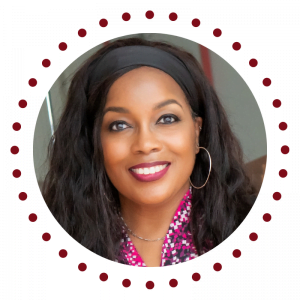
Want Karan to be Your Podcast Guest?
- Blended Workforces & the Gig Economy
- Critical Execution Tactics of High-performing Leaders
- Entrepreneurism & Leading Your Business

Want to be a Podcast Sponsor?
All sponsorships come with a featured spot on show notes pages.
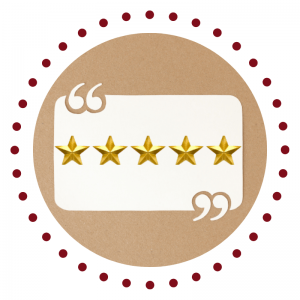
Like the Show? Please Leave a Review
If you like the show, it would mean the world to her if you left a quick review.
Your word is golden, so a HUGE thank you in advance!

#KeepInTouch
via our podcast alerts
Subscribe now to discover why thousands of monthly listeners who are passionate about doing their best work prioritize time each week to listen to the Blended Workforces @Work podcast.
#AboutSDL
#WhereToFindUs
MAILING
4480-H South Cobb Drive
PMB 219
Smyrna, GA 30080
PHYSICAL
2121 NewMarket Parkway
Ste. 108
Marietta, GA 30067
#ContactOptions
Customer Service Email:
service@shockinglydifferent.com
Call or Text:
770-384-1103
#Office Hours
MON-FRI
8:30 AM – 6:30 PM
Weekends By Appointment

